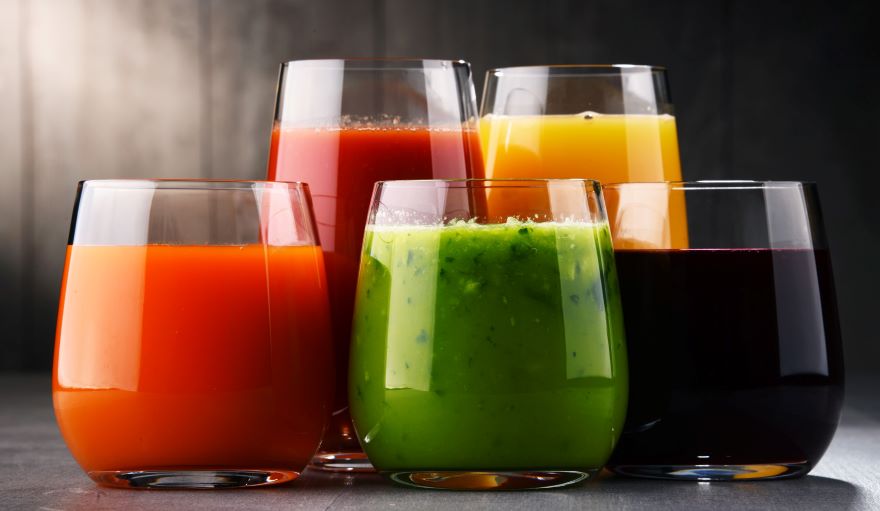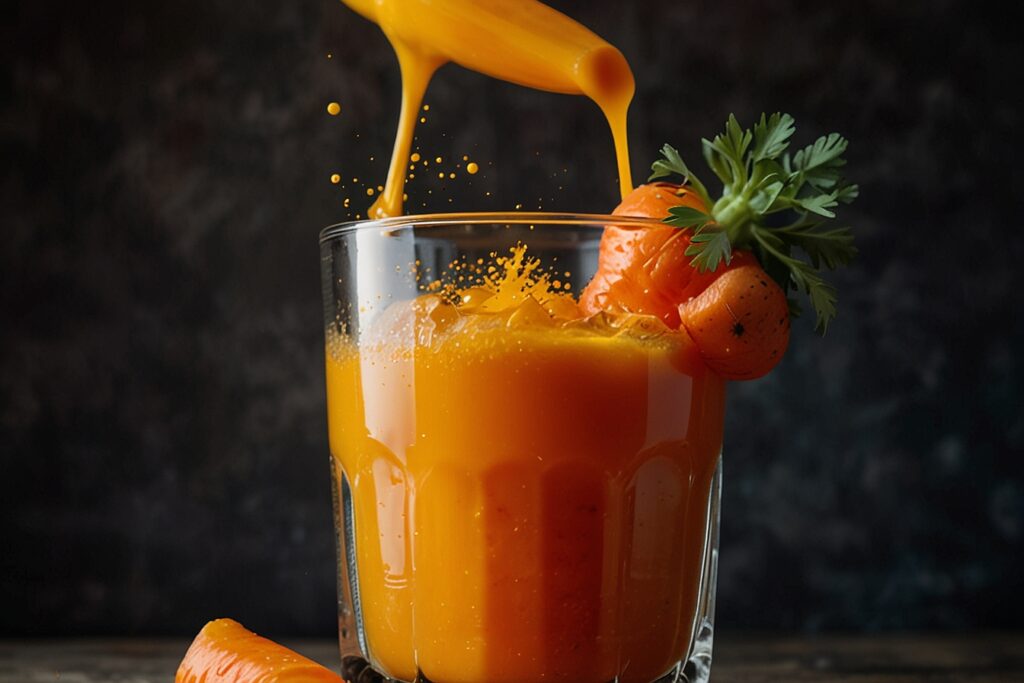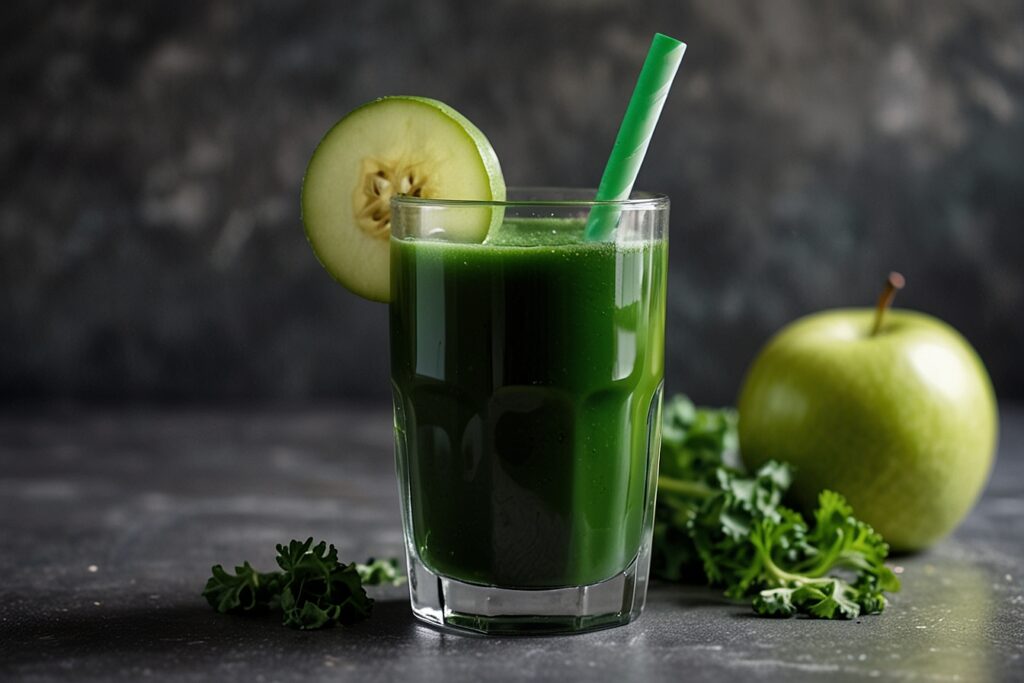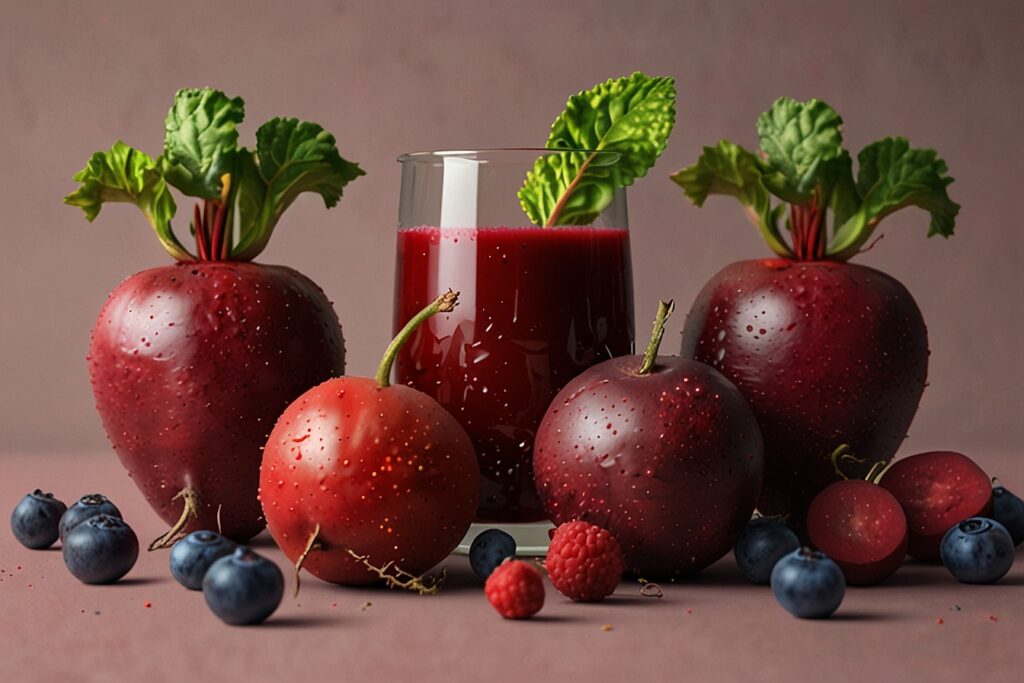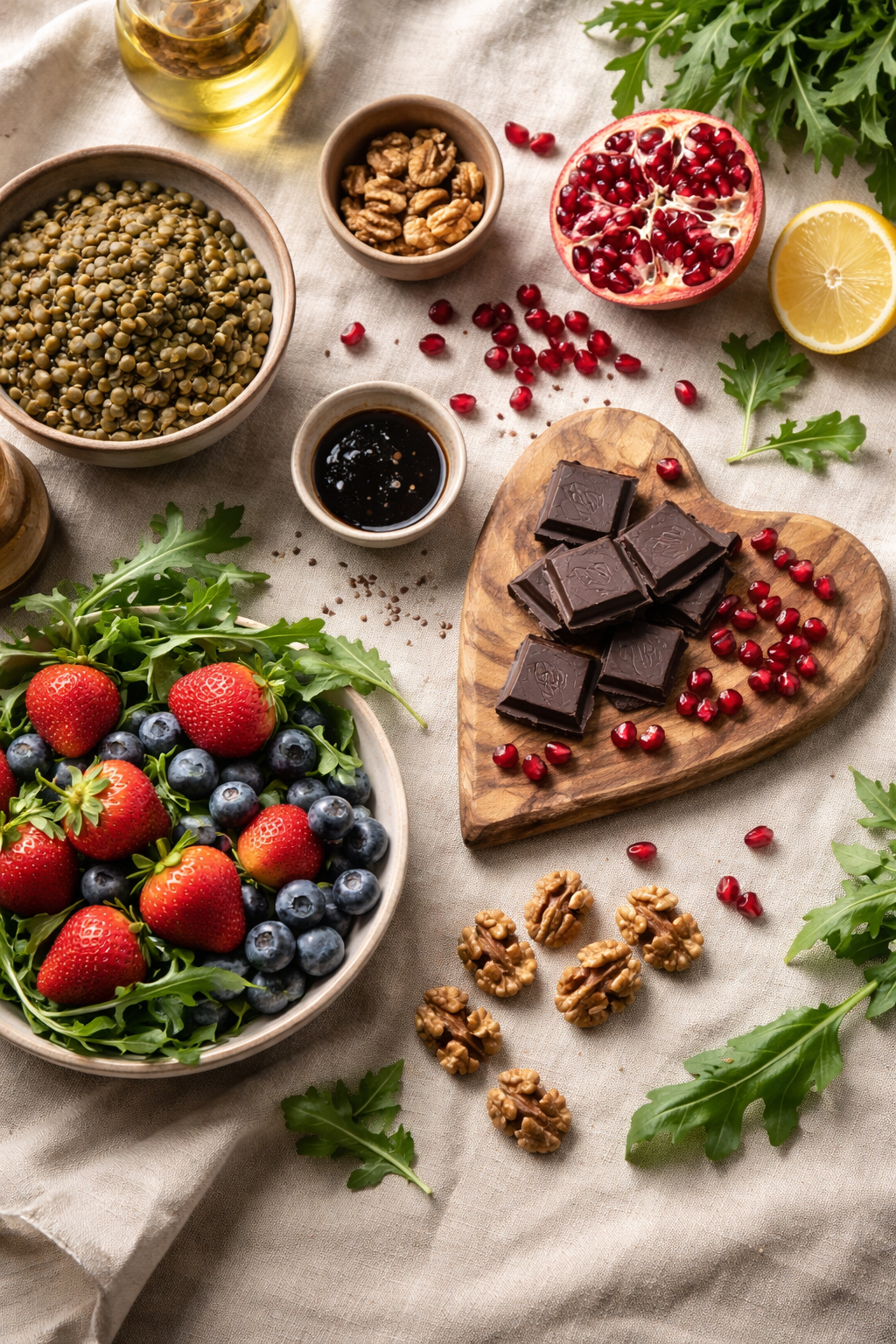Like many of you, I started my smoothie journey by buying pre-made juices from the store. I’d load my shopping cart with bottles of orange, apple, and various fancy juice blends, thinking I was making healthy choices. Then one day, I turned the bottle around and read the ingredients list—preservatives, added sugars, and words I couldn’t pronounce. This discovery was a turning point. I realized if I wanted truly healthy smoothies, I needed to make my own juice. But first, I had to make sure I had the right equipment for juicing.
Now, after years of making smoothies, they’ve become my daily ritual for packing in nutrients and keeping my diet on track. Through countless blends and experiments, I’ve learned that picking the right juice can make or break your smoothie game. Let me share what I’ve discovered about creating the perfect smoothie base and how different juices can transform your drink from good to amazing.
My Smoothie Journey
When I started making my own juice for smoothies, I made plenty of mistakes. I’d throw random fruits into my juicer, hoping for the best. Sometimes I’d end up with something too sweet—other times, too watery. But over time, I’ve figured out which combinations work best and why.
I discovered that fresh orange, pineapple, apple, carrot, and beet juice add natural sweetness and beautiful colors to my smoothies. My secret? Adjusting the amount of juice based on my taste preferences. Some days I want something sweeter; other days, I prefer a more subtle flavor.
Beyond fresh juice, I’ve fallen in love with alternatives like coconut water and almond milk. These became my go-to choices when I want a creamy texture without dairy. Plus, they bring their own unique benefits—coconut water for hydration and electrolytes, almond milk for protein and healthy fats.
Why Picking the Right Juice Changed My Smoothie Game
Let me tell you something that transformed my smoothie-making: juice selection affects everything. I mean everything—from taste to texture to nutrition. Through trial and error, I’ve learned what works best for different smoothie styles.
For fruit smoothies, I reach for apple juice or mango juice instead of citrus. Why? Apple juice lets those natural fruit flavors shine through without overpowering them. It adds just enough sweetness without going overboard.
But here’s the game-changer I wish someone had told me earlier: fruit juices pack a lot of sugar. Take orange juice—sure, it’s loaded with vitamin C, but it also comes with plenty of calories and sugar. That’s why I often mix coconut water or almond milk into my smoothies now. These options give me the nutrients I want without the sugar spike.
My Journey with Different Juice Flavors
Let me walk you through my experiments with different juices. Trust me, I’ve tried them all! When I add citrus juices like orange, lemon, or lime to my smoothies, they bring such a fresh kick. These are perfect for balancing out sweet fruits like mangoes and bananas. My tip? Start small with citrus—I once added too much lime juice and couldn’t drink my smoothie!
Berry juices became my secret weapon for making gorgeous purple and red smoothies. I mix cranberry, blueberry, or raspberry juice with spinach or kale, and nobody can tell there are greens in there! Just remember, berry juices can be pretty strong, so start with a small amount.
Let me share my vegetable juice experiments—I went through a phase where I put beet and carrot juice in everything. They made my smoothies naturally sweet with an earthy taste that worked amazingly well with apples and pears. Plus, my smoothies got this thick, satisfying texture.
I’ve also discovered the magic of juice blends. Apple-cranberry, orange-pineapple, and kale-lemon create harmonious tastes that complement many ingredients. These combinations have become my favorites for adding complex flavors without overdoing it.
Health Factors I Think About
Over the years, I’ve become more mindful about what goes into my smoothies. Here’s what I pay attention to now:
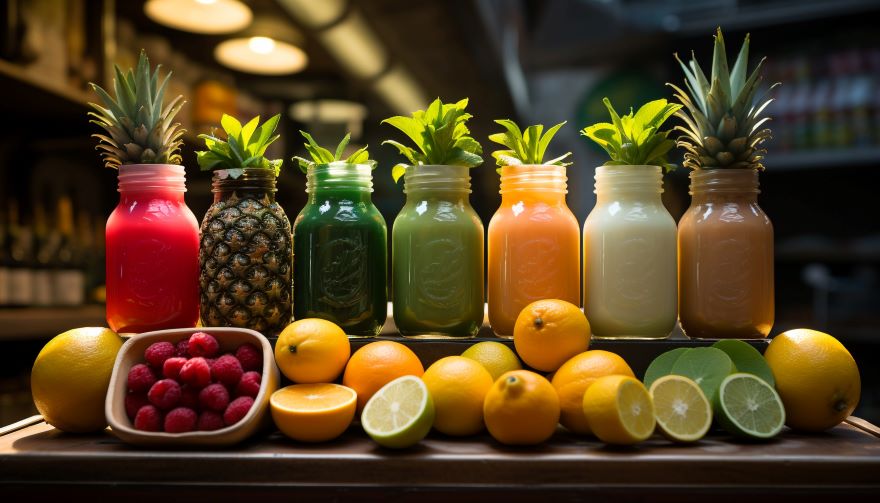
Sugar Content
When I first started, I dumped sugary juices into my smoothies without thinking twice. Then I learned one glass of orange juice had 21 grams of sugar! Now I stick to unfiltered apple juice or mix regular juice with water. My smoothies still taste great, but I feel much better about drinking them
Vitamins and Minerals
I look for juices packed with good stuff. Carrot juice gives me vitamin A, while beet juice loads me up with iron. Sometimes I throw in green juice from kale or spinach—they’re nutrient powerhouses! My morning smoothies now do double duty as a multivitamin.
Organic vs Regular Juice
Here’s what I’ve learned about organic choices. For fruits like strawberries and apples that tend to have more pesticides, I buy organic juice. But for things like avocados and kiwis, which have natural protection, I save money and go with regular juice. It’s about making smart choices that work for my budget and health.
My Favorite Juice Combinations for Different Smoothies
Green Smoothies
For my green smoothies, I mix fruit juice with water:
- Apple juice + spinach = can’t taste the greens!
- Orange juice + mango + kale = tropical green goodness
- Pineapple juice + chard = makes me feel like I’m on vacation
Protein Smoothies
When I make protein smoothies, I keep the juice light:
- Coconut water + vanilla protein powder = refreshing post-workout drink
- Almond milk + chocolate protein = tastes like dessert
- Watermelon juice + unflavored protein = summer in a glass
Detox Smoothies
My detox smoothies need clean, nutritious juices:
- Beet juice + apple = earthy and sweet
- Fresh green juice + lemon = feels like liquid energy
- Ginger-turmeric juice = spicy and invigorating
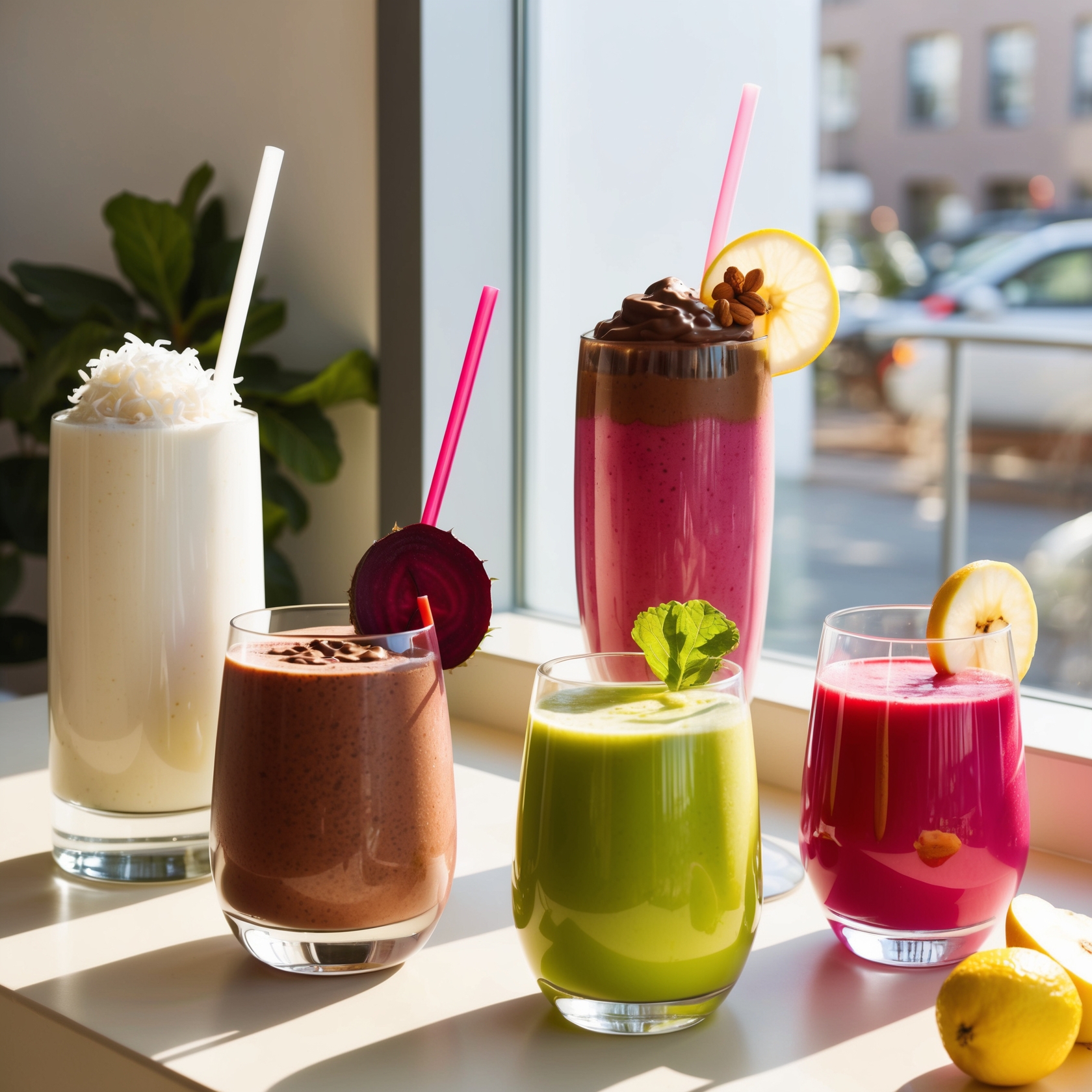
Energy Boosters
When I need a pick-me-up:
- Acai juice + berries = antioxidant blast
- Pomegranate juice + green tea = sustained energy
- Orange/grapefruit mix = morning wake-up call
My Top 3 Favorite Smoothie Recipes
After countless experiments, here are three recipes that never fail me. I make these weekly, and they showcase how different juices can transform your drinks.
Green Goddess Morning Starter
This smoothie keeps me energized through busy mornings. The apple juice perfectly masks the greens while keeping things light and refreshing.
Ingredients:
- 1 cup fresh apple juice (I prefer unfiltered)
- 2 cups baby spinach
- 1 green apple, cored and chopped
- ½ cucumber
- ½ banana (frozen)
- 1 tablespoon chia seeds
- 4-5 ice cubes
- Optional: 1 tablespoon honey if needed
Instructions:
- Pour apple juice into your blender first
- Add spinach, apple chunks, and cucumber
- Top with frozen banana and chia seeds
- Blend on high for 60 seconds
- Add ice and blend again until smooth
My Personal Tips: I freeze my bananas when they’re perfectly ripe – they make the smoothie extra creamy. If your apple juice is tart, add a touch of honey.
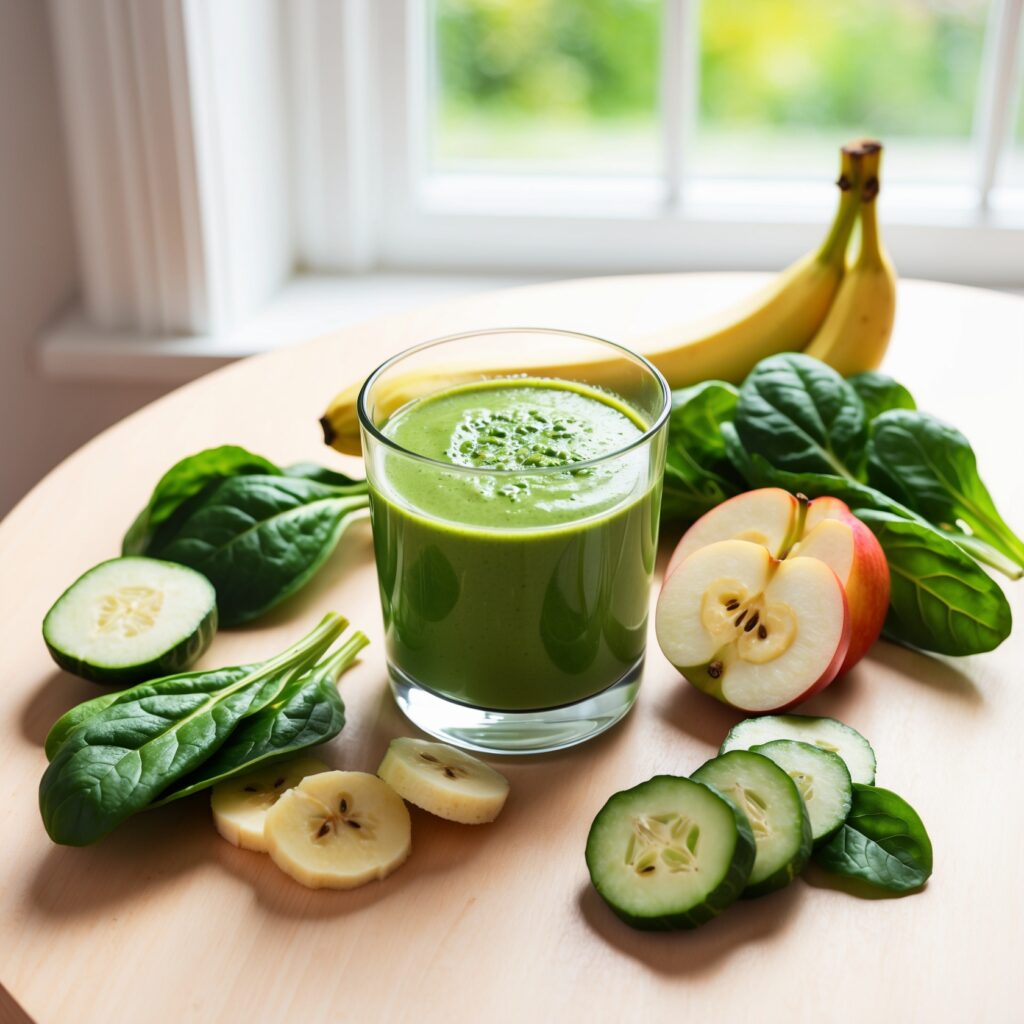
Protein Power-Up
This recipe got me through marathon training. The coconut water provides electrolytes while almond milk adds creaminess without heaviness.
Ingredients:
- ½ cup coconut water
- ½ cup unsweetened almond milk
- 1 scoop vanilla protein powder
- 1 cup mixed berries (frozen)
- 1 tablespoon almond butter
- 1 tablespoon flax seeds
- ¼ cup rolled oats
- Dash of cinnamon
Instructions:
- Mix coconut water and almond milk in blender
- Add protein powder, berries, and almond butter
- Sprinkle in flax seeds and oats
- Add cinnamon
- Blend until smooth and creamy
My Personal Tips: Soaking the oats in the liquid for 5 minutes before blending makes them disappear into the smoothie.
Tropical Energy Blast
This smoothie saved me during afternoon slumps. The combination of pineapple juice and mango creates the perfect pick-me-up.
Ingredients:
- 1 cup pure pineapple juice
- 1 cup frozen mango chunks
- 1 orange, peeled and segmented
- ½ banana
- 1 inch fresh ginger, peeled
- 1 tablespoon coconut flakes
- 1 tablespoon hemp seeds
- Small handful of mint leaves
Instructions:
- Start with pineapple juice
- Add frozen mango and orange segments
- Drop in banana chunks and ginger
- Add coconut flakes and hemp seeds
- Top with mint leaves
- Blend until smooth and frothy
My Personal Tips: Fresh ginger makes a huge difference – I keep mine in the freezer and grate what I need. The mint adds a refreshing kick that wakes me up.
My Process for Making Fresh Juice
My juicing journey starts with picking the freshest produce. I learned that seasonal fruits and vegetables not only taste better but cost less too. In summer, I go crazy with stone fruits and berries. In winter, I stick to citrus and root vegetables.
I always wash everything thoroughly—trust me, one bad experience taught me this lesson! For tough-skinned fruits like oranges, I peel them. But for apples, I leave the skin on—that’s where lots of nutrients hide.
I cut everything into pieces that my juicer can handle. Through some messy trial and error, I’ve figured out the perfect size for each fruit and vegetable. When the juicing process is done, I either use it right away or store it in an airtight container. Fresh juice stays good for about 24 hours in the fridge.
Essential Equipment for Your Smoothie Journey
Recommended Equipment for Smoothie Making For those looking to elevate their smoothie game, the Ninja BL610 Professional Countertop Blender is an excellent choice. With its powerful 1000-watt motor and large 72-ounce pitcher, it’s perfect for creating smooth, well-blended smoothies with ease. Whether you’re blending frozen fruits, leafy greens, or ice, this blender can handle it all, making it an ideal companion for your smoothie-making adventures.
- PROFESSIONAL POWER: 1000 watts of professional power can crush ice and breakdown any tough ingredient.Power source : Corded Electric.Amperage : 12.5 amps
- XL CAPACITY: The 72 oz professional blender pitcher is excellent for making frozen drinks and creamy smoothies for the entire family. 64 oz. max liquid capacity
- INTELLIGENT TECHNOLOGY: Total Crushing Technology delivers unbeatable power with blades that pulverize and crush through ice, whole fruits and vegetables in seconds.
- ICE CRUSHING: Blast ice into snow in seconds and blend your favorite ingredients into delicious resort-style frozen drinks
- RECIPE INSPIRATION: The included recipe guide provides drink and dish making inspiration.
A set of high-quality mixing bowls is essential for preparing ingredients for your smoothies. The Cuisinart Stainless Steel Mixing Bowls with Lids offer durability and versatility. Use them for measuring, mixing, and even storing your smoothie ingredients. The included lids make it easy to prep ahead and keep your ingredients fresh.
- 1-1/2-Quart, 3-Quart and 5-Quart sized bowls
- High quality stainless steel
- Dishwasher safe
- Freezer safe
- Refrigerator safe
If you’re serious about making the best smoothies with your favorite juices, investing in a high-quality blender like the Vitamix 5200 Blender is essential. This professional-grade blender is a top choice for smoothie enthusiasts and culinary experts alike, thanks to its powerful performance and versatile features.
- Variable Speed Control: Easily adjust speed to achieve a variety of textures. The dial can be rotated at any point during the blend, so you’re in complete control
- Large Batches: The size and shape of the self-cleaning 64-ounce container is ideal for blending medium to large batches. Design Feature : Radial cooling fan and thermal protection system
- Hot Soup: The blades in the Vitamix container reach speeds fast enough to create friction heat, bringing cold ingredients to steaming hot in about six minutes
- Hardened Stainless-Steel Blades: Our aircraft-grade stainless steel blades are designed to handle the toughest ingredients, so from the first blend to the last, you get the same quality results
- Self-Cleaning: With a drop of dish soap and warm water, your Vitamix machine can clean itself in 30 to 60 seconds
Here are some of my favorite juices you may like to try
Final Thoughts
My journey from store-bought juices to crafting my own smoothies has been eye-opening. What started as a simple switch to avoid preservatives turned into a passion for creating delicious, nutrient-packed drinks. With fresh ingredients, the right equipment, and a bit of creativity, I’ve discovered that making healthy smoothies isn’t just about nutrition—it’s about enjoying the process of caring for yourself.
Sometimes all it takes is a small change to make a big difference in your health journey. Making your own juice for smoothies might seem like extra work, but it’s a simple way to love yourself a little more each day. You don’t need to completely transform your diet or give up your favorite treats—just find those small moments where you can choose to nourish your body. Whether it’s starting your morning with a fresh green smoothie or ending your afternoon with a fruity blend, remember that every small step toward better health counts. After all, it’s not about perfection—it’s about making conscious choices that make you feel good, one smoothie at a time.
*We may earn a commission for purchases made using our links. Please see our disclosure to learn more.

